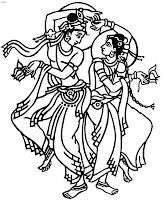Set along the Konkan belt is a little village called Ganapatipule.
It's an hour's drive from Ratnagiri. When you set off from the dirty, messy streets of Ratnagiri, you will definitely not expect what you get when you are half way through.
But before you set off, make a trip to the Ratnagiri fort. It is best to make the trip early in the morning (that is when our train arrived), because then the heat gets so annoying, you won't be able to enjoy the sights. The fort is quite boring in itself, but it is the view that is striking. The blue clear sea down below, and the mountains in the distance- breathtaking. Sit in one of the 'windows' and lose yourself in the beauty of your surrounding.
Then begins the hour long journey to Ganapatipule. The sights begin when you are driving through the mountain roads. It is a wall of mud and rock on one side and hold your breath- almost virgin beaches with blue waters on the other. The greenery around, the peaceful atmosphere and looking down on the white sand and blue water, you won't believe you are just h
alf an hour away from a totally different civilization.
Reach Ganapatipule and you have every house turned into a lodge. Not that there are way too many houses at that. You have little restaurants serving thalis and little else, and some of the more 'grand' ones that serve 'Panjabi' cuisine too. The roads are hardly cemented except in a few places, and you will like walking below the trees on the mud path to the beach. This walk in itself is quite pleasing and the instant you start, you know you are in another dimension altogether. Away from your daily rigmarole.
The beach is a haven in itself. Clear blue waters and almost white sands, unpolluted by plastic and other human remnants. If not for the Coconut water shacks lining it, or a few bunches of pilgrims on one corner of the beach near the temple, it would resemble the virgin beaches that were spotted all along our journey.
Sitting in the water all day baking in the sun and frolicking among the waves, we just didn't realise how fast the time passed. There could have been so much more we could have done like cycling down the roads or hiking a little to nearby places, discovering new beaches - but all we
did was turn into water buffaloes. But that too was great fun!
Back to the place... There is also the Ganapati temple. Not quite small, it is better to visit the temple either early during the day or about an hour before sunset. It has a hillock which is holy and you can walk around it. That is a holy Hindu ritual called Parikrama. It't not the holy part that is good here, it is the scenery you encounter while walking around the hill. On one side is greenery and the other side holds a brilliant sea view. Even during the night, you may not be able to see the waters, but the pinch in the air and the chilly winds will make you feel wonderful.
After the walk, you can probably lounge on the sea, gazing that the endless number of stars. This view is impossible from a city. Whats more, you can even spot more than a few shooting stars. Watch the sky, peer into the darkness, feel the cool sand beneath you or breathe in the slightly salty, slightly chilly sea breeze. It will all feel therapeutic.
As for food, I recommend the local thalis at least once. But if you can't digest Maharashtrian food, or coconut in your preparations, there is a garden restaurant which serves almost everything. There is also the MTDC restaurant which I personally did not have the stomach for. Though the MTDC rooms are splendid if you have the budget. They command a great view of the beach.
All in all, Ganapatipule is one of those escapades that you go to when you have a nice long
weekend, and don't want to tire yourself out. Sit, chill, sunbathe (or burn like I did). But remember, if you want beer, you may have to get your own from somewhere. 'Cos this Ashtavinayak-temple-housing-village mostly doesn't have any.
Here's a picture log of my Ganapatipule trip, beginning from Ratnagiri station.









